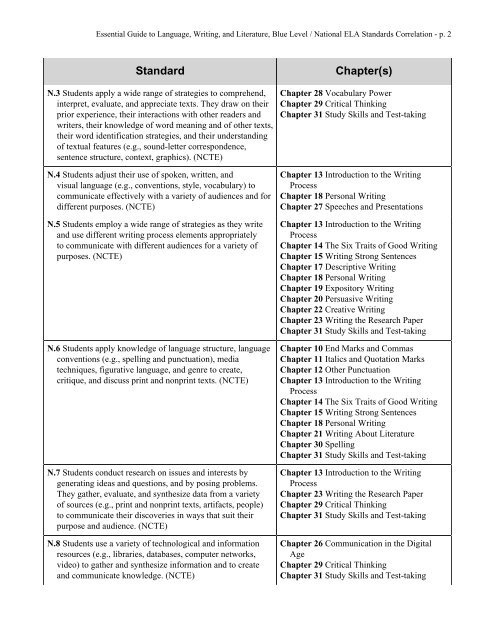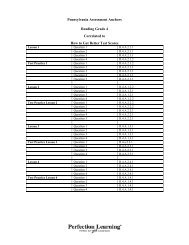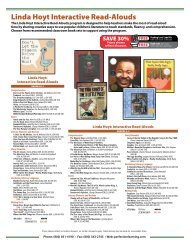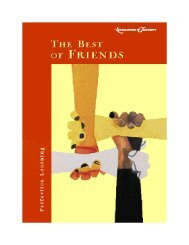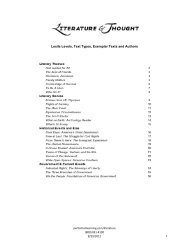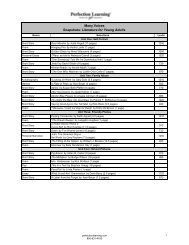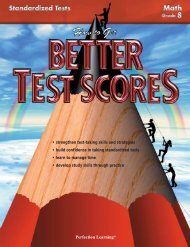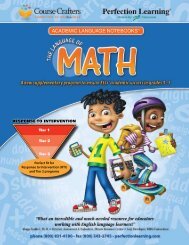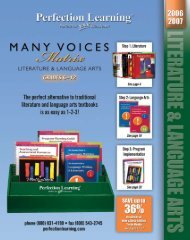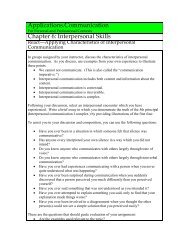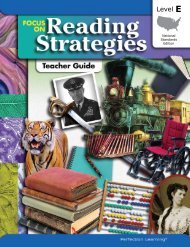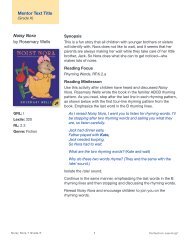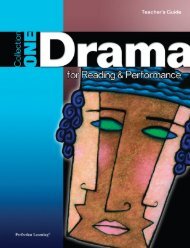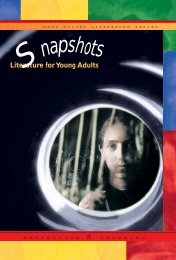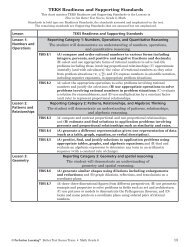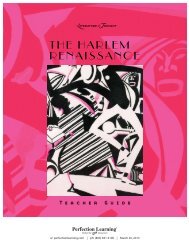National ELA Standards (Grade 9) - Perfection Learning
National ELA Standards (Grade 9) - Perfection Learning
National ELA Standards (Grade 9) - Perfection Learning
Create successful ePaper yourself
Turn your PDF publications into a flip-book with our unique Google optimized e-Paper software.
Essential Guide to Language, Writing, and Literature, Blue Level / <strong>National</strong> <strong>ELA</strong> <strong>Standards</strong> Correlation - p. 2<br />
Standard<br />
N.3 Students apply a wide range of strategies to comprehend,<br />
interpret, evaluate, and appreciate texts. They draw on their<br />
prior experience, their interactions with other readers and<br />
writers, their knowledge of word meaning and of other texts,<br />
their word identification strategies, and their understanding<br />
of textual features (e.g., sound-letter correspondence,<br />
sentence structure, context, graphics). (NCTE)<br />
N.4 Students adjust their use of spoken, written, and<br />
visual language (e.g., conventions, style, vocabulary) to<br />
communicate effectively with a variety of audiences and for<br />
different purposes. (NCTE)<br />
N.5 Students employ a wide range of strategies as they write<br />
and use different writing process elements appropriately<br />
to communicate with different audiences for a variety of<br />
purposes. (NCTE)<br />
N.6 Students apply knowledge of language structure, language<br />
conventions (e.g., spelling and punctuation), media<br />
techniques, figurative language, and genre to create,<br />
critique, and discuss print and nonprint texts. (NCTE)<br />
N.7 Students conduct research on issues and interests by<br />
generating ideas and questions, and by posing problems.<br />
They gather, evaluate, and synthesize data from a variety<br />
of sources (e.g., print and nonprint texts, artifacts, people)<br />
to communicate their discoveries in ways that suit their<br />
purpose and audience. (NCTE)<br />
N.8 Students use a variety of technological and information<br />
resources (e.g., libraries, databases, computer networks,<br />
video) to gather and synthesize information and to create<br />
and communicate knowledge. (NCTE)<br />
Chapter(s)<br />
Chapter 28 Vocabulary Power<br />
Chapter 29 Critical Thinking<br />
Chapter 31 Study Skills and Test-taking<br />
Chapter 13 Introduction to the Writing<br />
Process<br />
Chapter 18 Personal Writing<br />
Chapter 27 Speeches and Presentations<br />
Chapter 13 Introduction to the Writing<br />
Process<br />
Chapter 14 The Six Traits of Good Writing<br />
Chapter 15 Writing Strong Sentences<br />
Chapter 17 Descriptive Writing<br />
Chapter 18 Personal Writing<br />
Chapter 19 Expository Writing<br />
Chapter 20 Persuasive Writing<br />
Chapter 22 Creative Writing<br />
Chapter 23 Writing the Research Paper<br />
Chapter 31 Study Skills and Test-taking<br />
Chapter 10 End Marks and Commas<br />
Chapter 11 Italics and Quotation Marks<br />
Chapter 12 Other Punctuation<br />
Chapter 13 Introduction to the Writing<br />
Process<br />
Chapter 14 The Six Traits of Good Writing<br />
Chapter 15 Writing Strong Sentences<br />
Chapter 18 Personal Writing<br />
Chapter 21 Writing About Literature<br />
Chapter 30 Spelling<br />
Chapter 31 Study Skills and Test-taking<br />
Chapter 13 Introduction to the Writing<br />
Process<br />
Chapter 23 Writing the Research Paper<br />
Chapter 29 Critical Thinking<br />
Chapter 31 Study Skills and Test-taking<br />
Chapter 26 Communication in the Digital<br />
Age<br />
Chapter 29 Critical Thinking<br />
Chapter 31 Study Skills and Test-taking


